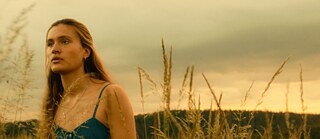Trotta and Petzold, Schanelec, Atef and Hochhäusler – believe it or not, five out of 19 competition entries come from Germany, but something else is new too. Should we be expecting erotic fireworks?
No one can say that Carlo Chatrian doesn’t give German film a chance: the first post-covid Berlinale competition features no less than five films made completely or partly in Germany. The names are well-known: Christian Petzold, Angela Schanelec and Christoph Hochhäusler – known as the Berlin School – you might call them regulars, more or less, with Margarethe von Trotta even considered a veteran at 80. Whether that indicates a good year or not is a matter of faith.The one we least expected was Roter Himmel (Afire) by Christian Petzold. The director of Barbara (2012) and Transit (2018) clearly kept very quiet about the making of this. Because it included several erotic and also homosexual scenes, it was essential for filming to be done after the pandemic, hence without a mask – understandably. It turned into a lockdown drama anyway: Four young people meet in a holiday home on Baltic Sea and experience love, whilst forest fires rage around them. Evidently things are hotting up in Christoph Hochhäusler’s Bis ans Ende der Nacht (Till the End of the Night), heralded as a film noir with an undercover agent and a trans woman. It’s Hochhäusler’s first film since Die Lügen der Sieger (The Lies of the Winners), which he presented at Cannes in 2014. In the meantime he has spent most of his time lecturing in film studies.
Fatal relations
Angela Schanelec’s Music is intended as an adaptation of the Oedipus myth, some of which was filmed in Greece. Meanwhile Margarethe von Trotta’s very special love story travels across half of Europe – Berlin, Zurich, Rome – in Ingeborg Bachmann – Reise in die Wüste (Ingeborg Bachmann – Journey into the Desert), which tells the story of the dramatic relationship between the Austrian author and her Swiss colleague Max Frisch. Trotta demonstrated a good understanding of biographies with Hannah Arendt (2012). Vicky Krieps and Ronald Zehrfeld play the leading roles in this relationship drama, the love letters of which were published only recently.It's true that festival director Chatrian has been making a big thing lately about not sticking to quotas in his choices of film. But a strong tendency towards amour fou can hardly be denied. In the literary film Irgendwann werden wir uns alles erzählen (Someday We’ll Tell Each Other Everything) by Emily Atef – who entered the competition in 2018 with the Romy Schneider biopic 3 Tage in Quiberon (3 Days in Quiberon) – a 19-year-old meets a man twice her age at the time of German Reunification in 1990. Her film in particular was chosen, says Chatrian, “because eroticism is part of life”. For the Berlinale, in the Competition category at least, this is fairly new. How exciting!
Related Links
February 2023
